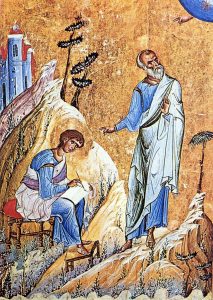 [Today] On May 8, we celebrate one of the two feasts of the Holy Apostle and Evangelist John, the brother of James. The other is on September 26, the day of his falling asleep. The fourth Gospel is attributed to John, and we can truly call it a “theo-logical,” for it witnesses most clearly to the mystery of the Incarnation, of the Word of God taking flesh in the womb of the Holy Theotokos for our salvation. It is the most sublime Gospel, and it gave John the title “Theologian.”
[Today] On May 8, we celebrate one of the two feasts of the Holy Apostle and Evangelist John, the brother of James. The other is on September 26, the day of his falling asleep. The fourth Gospel is attributed to John, and we can truly call it a “theo-logical,” for it witnesses most clearly to the mystery of the Incarnation, of the Word of God taking flesh in the womb of the Holy Theotokos for our salvation. It is the most sublime Gospel, and it gave John the title “Theologian.”
The Byzantine Church have this gospel a certain priority, and it is read in the most joyful and glorious time of the year, from Pascha to Pentecost. This Gospel is the very essence of the apostolic witness, through which we come to faith in Christ, as indeed John foretold, when the risen Jesus says to Thomas, “Blessed are those who have not seen and have believed,” (John 20:29) because we have all heard of the divinity of the Lord through the witness of the apostles. Some try to discredit Christian faith by pointing out that John’s Gospel was the last to be written, that the first Gospel, Mark, does not mention the divinity of Jesus, and that faith in the Incarnation is then a later Christian development. They do this by trying to fit the Gospels into a linear line, from the earliest to the latest, and it is easy to fall for this.
However, the development of the Gospels in not linear, but they arise from different communities, and each has a vision of Christ. Indeed, does not St. Mathew’s Gospel proclaim the truth of the Trinity, where the risen Jesus proclaims, “Go, therefore, and make disciples of all nations, baptizing them in the name of the Father, and of the Son, and of the holy Spirit” (Matthew 28:19). And – yes – there are many other witnesses to Jesus’ divinity in the epistles and apostolic writings. The letter to the Hebrews says, “[Jesus] who is the refulgence of [the Father’s] glory, the very imprint of his being, and who sustains all things by his mighty word” (Hebrews 1:3). Rejoice, therefore, in this holy season in the glory of the risen Christ so beautifully proclaimed by John. It is John who tells us, “God is light, and in him there is no darkness at all. If we say, “We have fellowship with him,” while we continue to walk in darkness, we lie and do not act in truth. But if we walk in the light as he is in the light, then we have fellowship with one another, and the blood of his Son Jesus cleanses us from all sin” (1 John 1:5-7).
It is John who tells us, “Beloved, let us love one another, because love is of God; everyone who loves is begotten by God and knows God. Whoever is without love does not know God, for God is love. (1 John 4:7-8)” In every Liturgy we accept this apostolic witness when the deacon invites us, “Let us love one another, so that with one mind we may profess.”
Meditation by Archpriest David Petras
![]() Today is the feast of St. Mary Magdalen
Today is the feast of St. Mary Magdalen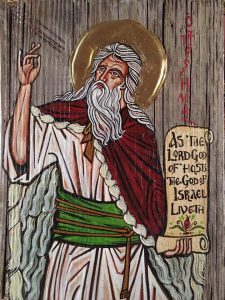 Today the Byzantine Church honors the memory of The Holy Great Prophet Elijah.
Today the Byzantine Church honors the memory of The Holy Great Prophet Elijah.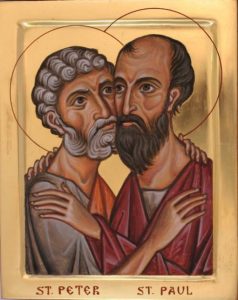 Gods’ love, mercy and compassion shine forth most clearly in the feast of these two apostles. Peter was enthusiastic in his faith in Christ, “Peter said to him, ‘Even though I should have to die with you, I will not deny you.’ And all the disciples spoke likewise. (Matthew 26:35)” When the trial came, however, Peter did deny Christ three times, and all the apostles, except one, ran out of fear. Yet Peter wept for his weakness, and his weakness turned to strength, though not of his own human power, but by the grace of God. For when he confessed Jesus to be the Messiah, the Lord told him: “Simon Peter said … ‘You are the Messiah, the Son of the living God.’ Jesus said to him in reply, ‘Blessed are you, Simon son of Jonah. For flesh and blood has not revealed this to you, but my heavenly Father,’ (Matthew 16:16-17) and it was on this rock of faith that the Church was established.
Gods’ love, mercy and compassion shine forth most clearly in the feast of these two apostles. Peter was enthusiastic in his faith in Christ, “Peter said to him, ‘Even though I should have to die with you, I will not deny you.’ And all the disciples spoke likewise. (Matthew 26:35)” When the trial came, however, Peter did deny Christ three times, and all the apostles, except one, ran out of fear. Yet Peter wept for his weakness, and his weakness turned to strength, though not of his own human power, but by the grace of God. For when he confessed Jesus to be the Messiah, the Lord told him: “Simon Peter said … ‘You are the Messiah, the Son of the living God.’ Jesus said to him in reply, ‘Blessed are you, Simon son of Jonah. For flesh and blood has not revealed this to you, but my heavenly Father,’ (Matthew 16:16-17) and it was on this rock of faith that the Church was established. [Today] On May 8, we celebrate one of the two feasts of the Holy Apostle and Evangelist John, the brother of James. The other is on September 26, the day of his falling asleep. The fourth Gospel is attributed to John, and we can truly call it a “theo-logical,” for it witnesses most clearly to the mystery of the Incarnation, of the Word of God taking flesh in the womb of the Holy Theotokos for our salvation. It is the most sublime Gospel, and it gave John the title “Theologian.”
[Today] On May 8, we celebrate one of the two feasts of the Holy Apostle and Evangelist John, the brother of James. The other is on September 26, the day of his falling asleep. The fourth Gospel is attributed to John, and we can truly call it a “theo-logical,” for it witnesses most clearly to the mystery of the Incarnation, of the Word of God taking flesh in the womb of the Holy Theotokos for our salvation. It is the most sublime Gospel, and it gave John the title “Theologian.”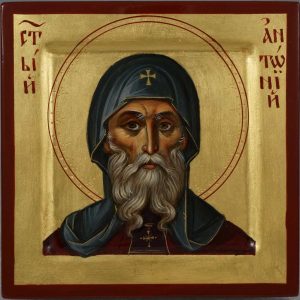 St. Anthony the Great, also called St. Anthony the Abbot (though he was a hermit) and St. Anthony of Egypt is commemorated on January 17. He is identified as the founder of desert monasticism, though the story of his life, particularly how he met St. Paul of Thebes, who preceded him into the desert, is a study of the search for Christian perfection. This story tells how he heard the gospel about the rich young man, to whom Jesus said, “If you wish to be perfect, go, sell what you have and give to the poor, and you will have treasure in heaven” (Matthew 19:21). When Anthony heard this gospel, he immediately divested himself of all his possessions and went into the desert to seek Christian perfection. This is really the calling of all Christians, as Jesus commanded, “Be perfect, just as your heavenly Father is perfect” (Matthew 5:47). For this we are baptized, that we might seek Godly perfection. St. Anthony imitated Christ when he heard this gospel, and just as Jesus went out into the desert after his baptism by John, in order to foil the wiles of Satan, so, too, does Anthony go to the desert to conquer the evil passions exploited by the temptation of the devil.
St. Anthony the Great, also called St. Anthony the Abbot (though he was a hermit) and St. Anthony of Egypt is commemorated on January 17. He is identified as the founder of desert monasticism, though the story of his life, particularly how he met St. Paul of Thebes, who preceded him into the desert, is a study of the search for Christian perfection. This story tells how he heard the gospel about the rich young man, to whom Jesus said, “If you wish to be perfect, go, sell what you have and give to the poor, and you will have treasure in heaven” (Matthew 19:21). When Anthony heard this gospel, he immediately divested himself of all his possessions and went into the desert to seek Christian perfection. This is really the calling of all Christians, as Jesus commanded, “Be perfect, just as your heavenly Father is perfect” (Matthew 5:47). For this we are baptized, that we might seek Godly perfection. St. Anthony imitated Christ when he heard this gospel, and just as Jesus went out into the desert after his baptism by John, in order to foil the wiles of Satan, so, too, does Anthony go to the desert to conquer the evil passions exploited by the temptation of the devil.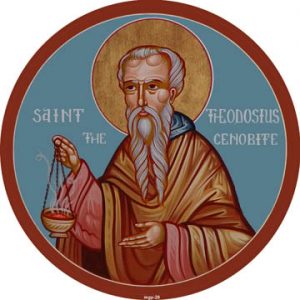 On the weekly liturgical calendar for this week you may have noticed that today’s saints is Theodosius, the Venerable Father and founder of monastic life lived in community.
On the weekly liturgical calendar for this week you may have noticed that today’s saints is Theodosius, the Venerable Father and founder of monastic life lived in community.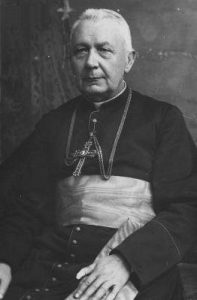 Blessed Hryhoriy Khomyshyn was the Eparchial Bishop of Stanislaviv (modern day eparchy of Ivano-Frankivsk), Ukraine. Arrested for his faith twice by the Soviet secret police; deported to NKVD prison in Kiev, Ukraine. The Bishop died in prison and considered a martyr.
Blessed Hryhoriy Khomyshyn was the Eparchial Bishop of Stanislaviv (modern day eparchy of Ivano-Frankivsk), Ukraine. Arrested for his faith twice by the Soviet secret police; deported to NKVD prison in Kiev, Ukraine. The Bishop died in prison and considered a martyr.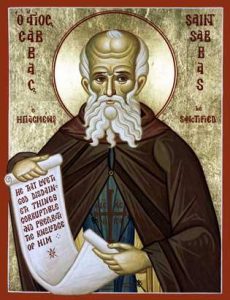 St. Sabbas lived from 439-532. His connection with the Feast of Christmas is that, like Christ, he was dedicated to God from the beginning of his life, imitating him from his birth Therefore, he was called “the sanctified one.” He entered the monastery at the age of eight. He was the founder of the St. Sabbas monastery in the area of Bethlehem, close to the place of our Lord’s birth. It was the Typicon (the Rule of Life for a monastery) of this monastery that became the model for the Byzantine order of the Divine Office.
St. Sabbas lived from 439-532. His connection with the Feast of Christmas is that, like Christ, he was dedicated to God from the beginning of his life, imitating him from his birth Therefore, he was called “the sanctified one.” He entered the monastery at the age of eight. He was the founder of the St. Sabbas monastery in the area of Bethlehem, close to the place of our Lord’s birth. It was the Typicon (the Rule of Life for a monastery) of this monastery that became the model for the Byzantine order of the Divine Office.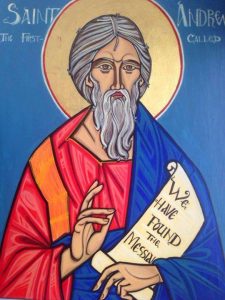 The feast of St. Andrew is the beginning of a new relationship of God with his people. He is the first-called, the first follower of Christ particularly as Rabbi, as Messiah and Savior. What does it mean to be Christian? It means to follow Christ without hesitation and without selfishness. This feast is truly a reflection of Christmas. Jesus is the first-born of the Father, the first-born of all creation, the new Adam, the re-Creator of the human race. Andrew is the first-called, but he is simply the forerunner of all who choose Christ, in a world that is hostile to Christ and his renewal. On this feast, we also begin the singing of Christmas stichera. At Psalm 140 of Vespers, we see that Bethlehem is filled with the fire of the Godhead, “Isaiah, dance for joy: receive the word of God. Prophesy to the Virgin Mary that the bush burning with fire will not be consumed by the radiance of our God.” At the Apostichera, we question the righteous Joseph, “Tell us, O Joseph: How is it that you bring the Maiden which you received from the Temple to Bethlehem pregnant?”
The feast of St. Andrew is the beginning of a new relationship of God with his people. He is the first-called, the first follower of Christ particularly as Rabbi, as Messiah and Savior. What does it mean to be Christian? It means to follow Christ without hesitation and without selfishness. This feast is truly a reflection of Christmas. Jesus is the first-born of the Father, the first-born of all creation, the new Adam, the re-Creator of the human race. Andrew is the first-called, but he is simply the forerunner of all who choose Christ, in a world that is hostile to Christ and his renewal. On this feast, we also begin the singing of Christmas stichera. At Psalm 140 of Vespers, we see that Bethlehem is filled with the fire of the Godhead, “Isaiah, dance for joy: receive the word of God. Prophesy to the Virgin Mary that the bush burning with fire will not be consumed by the radiance of our God.” At the Apostichera, we question the righteous Joseph, “Tell us, O Joseph: How is it that you bring the Maiden which you received from the Temple to Bethlehem pregnant?”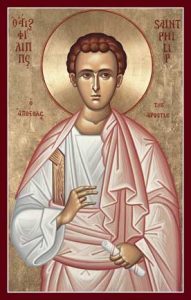 In today’s Gospel, Jesus calls Phillip, who immediately follows him. He then brings his friend Nathaniel to Jesus, “We have found the one about whom Moses wrote in the law, and also the prophets, Jesus son of Joseph, from Nazareth. (John 1:45)” This is the feast to begin our Christmas preparation. Phillip leads us to the one true Messiah, the child born of Mary in Bethlehem. The child “who, though he was in the form of God, did not rega
In today’s Gospel, Jesus calls Phillip, who immediately follows him. He then brings his friend Nathaniel to Jesus, “We have found the one about whom Moses wrote in the law, and also the prophets, Jesus son of Joseph, from Nazareth. (John 1:45)” This is the feast to begin our Christmas preparation. Phillip leads us to the one true Messiah, the child born of Mary in Bethlehem. The child “who, though he was in the form of God, did not rega